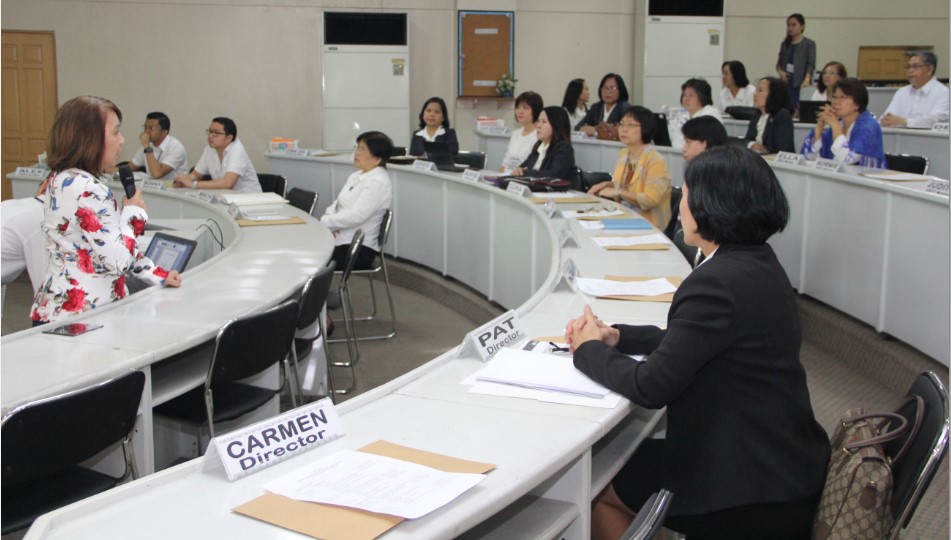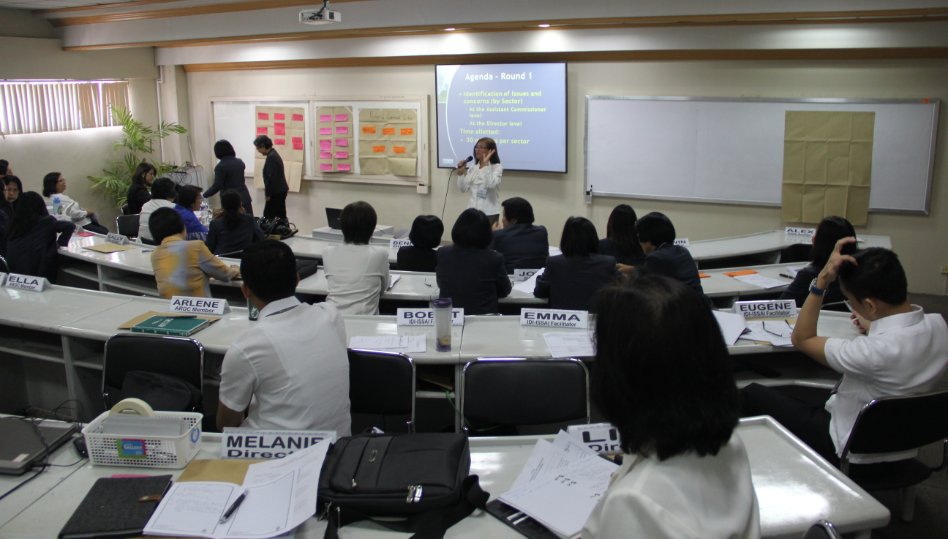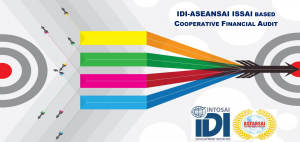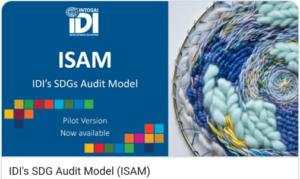Abigael P. Julao, Penelope R. Quesada and Maria Realiza R. Ysmael
Policy Research and Institutional Development Office
Professional and Institutional Development Sector
SAI Philippines (Commission on Audit)
The Commission on Audit (COA), the Supreme Audit Institution (SAI) of the Philippines, hosted the Focus Group Discussion (FGD) on the Implementation of International Standards of Supreme Audit Institutions (ISSAI) on February 16-20, 2015 at the Professional Development Center, COA, Quezon City, as part of its undertakings as the Project Leader of the ISSAI implementation of the ASEAN Supreme Audit Institutions (ASEANSAI).
COA Officer-in-charge Commissioner Heidi L. Mendoza, led the close than fifty (50) participants which included Assistant Commissioners, Directors and Auditors of the different audit sectors.
 Director Melanie R. Añonuevo giving instructions to the participants in one of the session activities.
Director Melanie R. Añonuevo giving instructions to the participants in one of the session activities.
The FGD, with the presence of an ISSAI expert, Ms. Karin Gabrielle Holmerin, Senior International Advisor of the Swedish National Audit Office, was made possible with the funding support of the GIZ (Deutsche Gesellschaft für Internationale Zusammenarbeit) through Dr. Denis Rene Roy and Ms. Jana Leutner, Advisors for Support to ASEANSAI.
On the onset, Commissioner Mendoza expressed the Commission’s appreciation to GIZ, saying, “Our heartfelt gratitude to the GIZ for their unwavering support and commitment to this endeavour. We assure you that every single centavo is money well spent and we pledge to give our 100% commitment to ensure that each program sees success.”
Professional and Institutional Development Sector (PIDS) Assistant Commissioner (AsCom) Luz L. Tolentino shared the background of the ISSAI-based Philippine Public Sector Standards on Auditing (PPSSA) and presented how the COA implements the ISSAI/PPSSA. According to AsCom Tolentino, “This FGD aims to confirm understanding of the ISSAI requirements, obtain agreement among the audit sectors on the ISSAI compliance documentation, identify the challenges in the implementation of ISSAI in the audit sectors, as well as propose solutions to address these challenges.”
AsCom Tolentino and Director Melanie R. Añonuevo of the Professional Development Office (PDO) of PIDS acted alternately as moderator of the five-day event. The Project on ISSAI Implementation is also in keeping with the workplan of the ASEANSAI Training Committee chaired by COA, whose activities and projects are coordinated and implemented by the PDO.
Director Añonuevo reiterated the rationale of the ISSAI implementation, instructed participants to break into groups and directed how to go about the business at hand: issues and challenges of implementing the ISSAIs in COA.
Ranking officials of the COA present during the FGD eagerly expressed their intent to actively participate in the efforts to ensure a coordinated and smooth ISSAI implementation through the audit sectors. The formation of a core group of ISSAI Pool of Facilitators also came into light that/which will spearhead the dissemination of knowledge gained from the FGD and the undertaking of activities to cover the widest range of actors for ISSAI implementation. These officials also gave assurance for their full support by agreeing to the signing of a Statement of Commitments.
Starting on the second day of the FGD, the group activities included the review of the issues/challenges and proposed solutions on the following ISSAI Series:
- 1200 – Overall Objectives of the Independent Auditor and the Conduct of an Audit in Accordance with International Standards of Auditing
- 1210 – Agreeing the Terms of Audit Engagements
- 1220 – Quality Control for an Audit of Financial Statements
- 1260 – Communication with Those Charged with Governance
- 1320 – Materiality in Planning and Performing the Audit
- 1330 – The Auditor’s Responses to Assessed Risks
- 1450 – Evaluation of Misstatements Identified during the Audit
- 1500 – Audit Evidence
- 1505 – External Confirmations
- 1520 – Analytical Procedures
- 1530 – Audit Sampling
- 1560 – Subsequent Events
- 1570 – Going Concern
- 1580 – Written Representation
- 1700 – Forming an Opinion and Reporting of Financial Statements
- 1705 – Modification to the Opinion in the IAR
The identified issues are now ready to undergo studies and be resolved through the combined efforts of the sectors of the Commission.
In agreement with the ISSAI-specific issues raised, as these were the same issues identified by other SAIs, Ms. Holmerin appeased the participants’ worries as she stated, “Don’t worry too much about these issues. You are on your way to implementing these guidelines.” “The best is learning by doing: You need to incorporate the training in actual audit work, applying the standards in the audit you are doing right now,” she added.
As part of the activities lined up in the program, participants were asked to answer individually a Questionnaire on ISSAI Implementation in Financial Audit for them to assess whether the said questionnaire is difficult to answer or not. This questionnaire will be farmed out to other ASEANSAI member countries to initially determine the status of ISSAI implementation in the SAI and the financial reporting framework of the country. Said questionnaire was refined based on the comments of the participants.
At the end of the FGD, an evaluation survey for participants was conducted. The first two aspects are the preparation and content of the event, and the use of FGD’s results.
Based on the survey results for the preparation and content of the event, it can be concluded that majority of the respondents were very much satisfied on important factors such as the information regarding the objectives, agenda and content of the event, the FGD methodology, the opportunities to contribute and benefit from discussions, and the support of facilities and equipment to this event. On another note, many suggested that more time should be allocated for discussion of each topic.
For questions regarding the use of the FGD’s results, most participants very much agreed on the importance of knowledge on ISSAI to their work, the identification of challenges faced on ISSAI implementation, and the motivation to independently deepen their understanding on ISSAI. On the other hand, many merely agreed that the solutions to address the challenges were consensual, and that they would be able to apply the new knowledge at their workplace.
Overall, the feedback given to the two abovementioned aspects is positive.
As follow-up measures to this event, many suggested that the knowledge gained from this FGD be shared to staff, auditors, and top management of the sectors of the participants, and to address the issues raised through policy study, formulation and implementation—all of which aim for a more effective implementation of ISSAI in COA.
At the last part of the program, Ascom Tolentino presented a line-up of activities to be undertaken on the following days, together with the time frame and persons in-charge for each activity. The goals of these activities are to further address the concerns raised during the FGD, to ensure that the useful knowledge gained by participants from the FGD would reach people from their respective sectors, and to ensure that such knowledge would be practiced in auditing. Among these activities are:
- Identification of the draft policies resulting from the FGD
- Drafting of the Statement of Commitments for the Assistant Commissioners
- Constitution of the ISSAI Pool of Facilitators, the group of FGD participants tasked to oversee the implementation of ISSAI and of the recommendations agreed upon
- First Meeting with the ISSAI Pool of Facilitators
Impressed by the depth of the discussions, Ms. Holmerin concluded that the group has come very far in understanding almost everything that needs to be done. On the other hand, the GIZ advisors expressed their intent to pattern the next FGDs in the ASEANSAI based on what they called “The Manila FGD Experience.”
Indeed, this is a milestone on the road for the smooth implementation of ISSAI in the Philippines and the continued advancement of the different members of the ASEANSAI in the realm of audit and quality public service.
 The participants of the FGD on ISSAI Implementation together with Ms. Karin Holmerin of Swedish National Audit Office, GIZ Advisors Dr. Denis Rene Roy and Ms. Jana Leutner and Ascom Luz Loreto-Tolentino
The participants of the FGD on ISSAI Implementation together with Ms. Karin Holmerin of Swedish National Audit Office, GIZ Advisors Dr. Denis Rene Roy and Ms. Jana Leutner and Ascom Luz Loreto-Tolentino

















